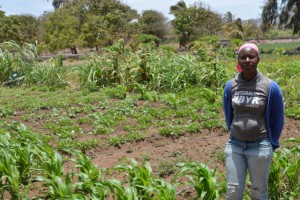Blog post written by Jennifer Baumwoll, original posted here: UNDP – Our Perspectives
When it comes to climate change adaptation, it is often said that we must identify the lessons learned and share these lessons with other practitioners. Given the enormous challenge posed by climate change, we must constantly ask ourselve s: how can we replicate or scale up what works?
s: how can we replicate or scale up what works?
And yet, adaptation couldn’t be more context specific. What I’ve learned from working with adaptation initiatives across the world is that not only are adaptation priorities different—from agricultural and water management to health and tourism—but measures that work in one location often will not work in another. For example, both Cabo Verde and Niger are dealing with water shortages, but the reservoir and water canal systems being built on a mountainous island in Cabo Verde are not feasible in the savannahs of Niger.
To complicate things further, adaptation is fundamentally a question of behavioral and social change, both of which are deeply rooted in specific cultural values and practices. In Cabo Verde, researchers from the National Institute for Agricultural Research and Development explained to me that they were finding it difficult to introduce a highly resilient purple potato crop into local villages, since the communities were wary of cooking and eating something that looked so different from their usual food.
In Sudan, a revolving fund was successful in supporting local investments in adaptive practices (e.g. new seeds, equipment and water pumps) because it was built on a traditional practice of women-led community funds called “Sandug”. Can this fund be replicated in contexts that don’t have the same deeply engrained cultural practices?
How do we successfully share and apply experiences across contexts?
This is the challenge we are tackling through the Canada-UNDP Climate Change Adaptation Facility (CCAF), supported by the Government of Canada. This facility captures results and shares experiences between six countries undertaking adaptation projects
: Cabo Verde, Cambodia, Haiti, Mali, Niger and Sudan. Each national adaptation initiative addresses food security and water management challenges in the face of climate change, with a strong focus on ensuring that these approaches are gender-responsive. In some cases, the initiatives are employing similar measures, such as introducing new resilient crops or establishing solar water pumps. These practices are being documented and shared widely. However, in many cases these projects are dealing with specific contextual needs, and sometimes even dramatic internal diversity. In Sudan, for example, the project is testing adaptation measures in four distinct agro-ecological zones.
So how do we make one adaptation experience relevant for other contexts?
Perhaps the answer lies in the fundamental components that make up these adaptation measures. These complex contextual details are exactly what we need to fully understand what makes successful adaptation. If these fundamental details can be broken down into their social, economic, political and cultural perspectives, it may be possible to extract critical trends and insights about the common factors that make an adaptation intervention successful, as well as how an intervention can be replicated in other contexts.
With advances in data visualization and complexity science, this is now possible. With support from the Innovation Facility funded by the Government of Denmark, the CCAF and the UN office in Cabo Verde are partnering with the University of Warwick’s Center for Interdisciplinary Methodologies to develop a prototype for what such a data-driven, lessons-learned platform could look like. Strengthening adaptation action will be a critical component of a needed ambitious and bold climate change agreement. Knowing how to learn from existing adaptation action, and scaling up what works, will be an essential contribution to this agreement.
In the lead-up to the COP21 Paris climate change conference, UNDP’s experts and practitioners highlight the challenges and opportunities in addressing this global concern. For more information, visit www.undp.org/cop21